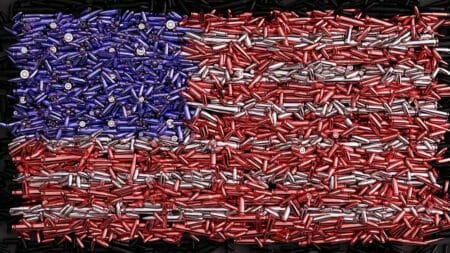When Congress slashed the $200 National Firearms Act (NFA) tax on suppressors and short-barreled rifles and shotguns down to $0, it set the stage for what many gun-rights supporters hoped would be the beginning of the end for these restrictions.
Within weeks, nearly every major gun-rights group had lined up behind two new lawsuits: one coalition led by Gun Owners of America (GOA) in the Fifth Circuit, and another led by the National Rifle Association (NRA) in the Eighth Circuit.
On the surface, the strategy looks simple—if the NFA’s tax was its constitutional fig leaf, removing the tax should make the law vulnerable.
However, as independent gun-rights attorney Matt Larosiere explained in The Weekly Reload podcast, winning these cases is a lot more complicated.
Two Lawsuits, Two Approaches
The NRA’s case, filed by the law firm Cooper & Kirk, combines two claims:
- Tax and Spend Clause Challenge – Arguing that without a real tax, the NFA exceeds Congress’s constitutional taxing authority.
- Second Amendment Challenge – Claiming that regulating suppressors and short-barreled rifles violates the right to keep and bear arms.
The GOA-led case focuses entirely on the tax argument. Both rely on the idea that if no revenue is collected, the NFA can no longer be justified under Congress’s taxing power—a power Congress explicitly cited when the NFA passed in 1934.
Why Tax Challenges Are Tough
Larosiere knows these arguments well—he’s brought similar cases before. The problem, he says, is that tax challenges must clear multiple legal hurdles. Courts don’t just ask, “Is there still a tax?” They also examine:
- Burden – Is the “tax” so heavy it’s more like a punishment?
- Intent – Does it require proof of knowing violation, like a criminal law?
- Enforcement – Is it enforced more like a criminal penalty than a revenue measure?
Even with the tax cut to $0, the NFA still collects revenue elsewhere—manufacturers and importers still pay annual occupational taxes, and machine guns and destructive devices still carry the $200 transfer tax. That means a judge could see these sections as part of an intact tax structure, not a dead letter.
As Larosiere put it, the change “takes a grain of difficulty off” the tax challenge, but it’s far from a knockout punch.
The Commerce Clause Problem
Even if plaintiffs win on the tax argument, Congress has another constitutional tool in its belt: the Commerce Clause. Since the New Deal era, the Supreme Court has allowed Congress to regulate goods that affect interstate commerce—sometimes even things made and kept entirely in one state. The NFA could be reframed under this power, much like the federal Gun-Free School Zones Act was rewritten after being struck down in U.S. v. Lopez.
Larosiere warns that the government could concede the tax point but still win by switching to a Commerce Clause defense.
Second Amendment Claims
The NRA-led lawsuit’s second claim may have a clearer path. Under the Supreme Court’s Bruen decision, the government must show that a firearm regulation is consistent with America’s historical tradition. The plaintiffs argue suppressor-equipped firearms are “arms” protected by the Second Amendment, and that there’s no historic tradition of banning them.
GOA’s case hints at a Second Amendment claim but doesn’t make one outright—something Larosiere suggests might limit their options later.
The Politics & the Hype
Beyond the courtroom, Larosiere criticized the way some groups market lawsuits as “historic first-ever challenges” when similar claims have been filed since 1937. He also cautioned against the constant “big win or big loss” fundraising hype. Incremental legal gains are the norm, not the exception, in the gun-rights fight.
That’s why, while cutting the tax to $0 isn’t a total repeal of the NFA, it’s still one of the few times in nearly a century that a federal gun restriction has been rolled back in any form.
Bottom Line
These lawsuits are important tests, but they face real legal headwinds:
- Courts have upheld the NFA’s tax structure for decades.
- The government can fall back on the Commerce Clause.
- Second Amendment claims are stronger post-Bruen, but not guaranteed.
For gun owners, the takeaway is clear: hope for a win, but understand the terrain. As Larosiere put it, fighting the NFA in court isn’t about flipping a switch—it’s about chipping away at a structure that’s been standing since 1934.
We are in dangerous times! We are NOT meeting our funding goals! Will you help out?
Reconciliation Bill Passes Making Tax Stamps for SBRs, SBS, & Suppressors $0






What utter BS, trying to make excuses for the court’s inexcusable behavior. The fifth already ruled NFA for machine guns unconstitutional because Hughes stopped collecting for machine guns. The NFA is unlawful abuse of powers Congress never had and will never be granted.
Grosjean v. American Press Co. was about a mere 2% gross being so hostile as to be unconstitutional. The 73rd Congress openly bragged their 4000% tax was prohibitive before Grosjean came down. The question isn’t if courts will consider the tax prohibitive, it objectively is, the question is if the judges will be traitors to the American republic and set aside their oath because they like the effect previous illegal rulings have had (remember Kavanaugh’s telling Congress his standard for going against previous rulings was not the Constitution, but rather if he “liked” the effect the ruling had had? That… Read more »
I am do tired pf gub’mint bullshit; when my constitutionl 2A rights are CLEARLY being infringed, having smoke blown up my ass and being told my rights aren’t being infringed.
“A well regulated militia, being necessary to the security of a free state, the right of the people to keep and bear arms SHALL NOT BE INFRINGED.” The second amendment to the constitution of the United State which is something that EVERY politician, judge, lawyer, peace officer, military servicemen etc. swears to uphold and defend under OATH before GOD ALMIGHTY with people of like mind and devotion being also present. Any infringement, any law that goes against the constitution is actually illegal thus the nfa and the atf are both illegal. If you can’t or won’t uphold the constitution after… Read more »
Don’t get me wrong, I’m life member and financial supporter of GOA, NRA, SAF, FPC, et el. Just got back from GOA GOALS in Knoxville, heading to SAF Gun Rights Policy Conference in Salt Lake City. But, had we had these lawyers pleading for our freedoms in 1776, we’d be enjoying tea and crumpets each afternoon today. And they would be gaslighting us about how much they have gained for us getting us two flavors of tea and two crumpets per person, Tea Tax reduced to $0…..please send your donations. The 2A is BIG BUSINESS for both sides. Not one… Read more »
“Even if plaintiffs win on the tax argument, Congress has another constitutional tool in its belt: the Commerce Clause” A clause inside another section of the constitution has made the rest of the constitution irrelevant. Constitutional lawyers joke that the commerce clause allows congress to control speech because speech needs oxygen, and oxygen crosses state lines, therefore is interstate commerce. Nearly our entire government is based on the commerce clause. Both Republican and Democrat have used this to support their powergrabs in government. Any attempt to discuss the commerce clause will result in both the democrats and the republicans coming down… Read more »
My prediction: GOA will follow through in its efforts to dismantle the NFA; The NRA will suggest a modest $2 tax be reinstated so the NFA remains a “legal” government agency.
The problem with arguing the excise tax constitutionality is the tax is on the exercise of an enumerated right . Just like a tax or news print paper or ink. See 1983’s Minneapolis Star v. Commissioner. The 1930’s case that upheld the NFA under Article I’s taxing authority didn’t answer the question, can the exercise of a constitutional right be taxed. Miller implied that if the arms taxed by the NFA are identified in the 2nd Amendment the NFA tax is unconstitutional. However; because, Heller v. DC in 2008 states that “people” includes each individual in the body politic and… Read more »